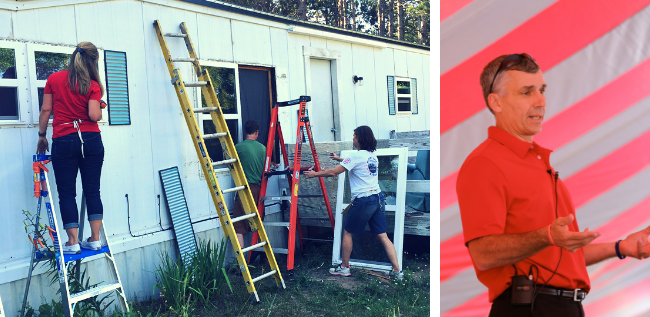In today’s world, we constantly hear talk about “affordable” housing. While affordability is crucial to solving any regional housing problem, I believe that “livable” housing is often overlooked. Much of our low-income housing stock is in a sad state of decline. Roofs are leaking. Windows and doors are letting valuable energy escape. Insulation is marginal at best, especially in the case of mobile homes. Who is tackling this problem?
When I tried finding organizations who were tackling this problem, the options were few and very limited in scope. So, in April, the Cherryland board of directors decided to make a big commitment toward the solution via a $100,000 annual donation for three years to Habitat for Humanity—Grand Traverse Region. These funds will be paid out quarterly and will be used for improving the building envelope of the homes of low-income Cherryland Electric Cooperative members.
The money will not affect our 2019 operating expenses. The funds will be taken from unclaimed capital credits which sit in equity on our balance sheet. After every capital credit retirement, 10% of the money on average goes unclaimed when we cannot find members who have moved off our system. Per state law, we are not allowed to do anything with the money for five years. After that, the funds become permanent equity that benefits the financial status of the cooperative.
While this is our most significant use of these funds in Cherryland history, the impact on our balance sheet will be minimal due to the strong financial position of your cooperative. The important impact lies in the improvements that can be made to the building envelope of mobile homes and stick-built homes that have grown old over past decades.
The obvious question is: Why? Well, the building envelope is probably the most neglected piece of the overall energy conservation puzzle. When you look at our state-mandated program of handing out LED bulbs, changing out industrial motors and replacing kitchen appliances, improvements in home insulation, doors, windows, and roofs are given minuscule incentives. Where does all the energy leak out of an older home? Right, it is going out the doors, windows, and roofs.
Why does CEC care about sealing up homes that are most likely using natural gas or propane for heat? The first reason is that it is simply the right thing to do for those who don’t have the means to do it themselves.
After the right thing, it becomes common sense. If we can save a low-income homeowner money on their heating bill, it becomes easier for them to pay their electric bill. We may even prevent them from having their gas shut off for non-payment, eliminating the need to plug in an electric radiant heater that only compounds the financial problems in the home.
When Habitat for Humanity told me of their plans to add building envelope improvement projects to their offerings in Grand Traverse, Leelanau, and Kalkaska counties, they became the partner Cherryland has been seeking for a long time. Habitat brings a volunteer base, building expertise and additional fundraising ability to the problem of deteriorating building envelopes.
Your board and management did not want to hand off a problem. We wanted to be an active part of the long-term solution. We went so far as to consider forming a subsidiary and doing building envelope work in-house. With Habitat, we have to neither reinvent the wheel nor compete in a tight market for raising funds. Thus, the $100,000 became a better solution for making a significant commitment to a community issue.
Everyone at Cherryland is proud to be working with Habitat for Humanity to bring this important program to reality. We look forward to working side by side with them to make a difference in improving the building envelope in homes across our service territory.
Cherryland members that are interested in participating in the Priority Home Repair program can learn more on Habitat for Humanity – Grand Traverse Region’s website. Potential participants are subject to Habitat’s income qualification standards.



Very good use of funds. Any idea how many homes will be impacted?
It will be a slow ramp up as Habitat gets this program started. The following numbers are tentative goals only and we are hoping to impact many more homes than these modest goals. We are shooting for 5-6 in 2019, 20-30 in 2020 and somewhere over 60 in 2021 and beyond. Obviously, if we can also increase community donations, the numbers may be even bigger.
This is huge! As a supporter of Habitat for Humanity and a long time fan/customer of Cherryland Electric, I applaud the board for this significant effort to “love thy neighbor”!
Maybe we should improve the capital credit program to get people their hard earned money back so they can invest it in the way they see fit.
As a twenty year customer the money that I am owed by Cherryland and Wolverine could fund a nice vacation.or would be better used by Freedom Builders.
We have returned $23 million to members over the last 10 years. It would be hard to improve on that and still maintain the strong financial position all members enjoy today. Cherryland has supported Freedom Builders for many years. The Habitat donation is all about doing more homes than Freedom Builders can handle in a year.
My point it that more should be done to get people their own money back. Wolverine hasn’t ever paid me back a dime.
Wolverine capital credits go back to Cherryland Electric Cooperative. Cherryland is the member of Wolverine and not individual distribution cooperative members like you and I. The Wolverine capital credits go directly to the margins/profits of Cherryland and have been a part of every retirement made over the last 10 years. So, all Cherryland members have gotten many, many dimes back from Wolverine over the years.
Sounds like politician math to me.
I’m sorry to hear that. Cherryland belongs to many cooperative entities such as Federated Insurance, Rural Electric Supply Cooperative, National Information System Cooperative, CoBank, National Rural Utilites Cooperative Finance Corporation to name a few. They all return margins/profits to Cherryland that become a part of every cooperative member’s capital credit retirement. It is not political math at all. It is the cooperative math that we have been doing for the past 81 years.
How many of those “entities” hire lobbyists?
That is a very political answer for sure. The answer will depend on the day and the issue at hand as it would for any business. All of these entities, like Cherryland, rely on our national association – the National Rural Electric Cooperative Association – to lobby on behalf of cooperative interests at the national level. NRECA is a voice on Capitol Hill for cooperative members across the country thus they also take on issues from time to time that are important to the family of electric cooperatives mentioned in my previous reply.
So you support bribery? How much to get our money back? Maybe only that you have held on to for more than 5 years so you can have the stability you desire that no other power company has.
We will have to agree to disagree on this point. I don’t think it warrants further back and forth discussion at this time.
Now that makes sense.
Bravo. We all need a helping hand sometime. Hope this great partnership between Cherryland and Habitat will make much needed improvements for members’ homes and endure for many years to come. Well done to so clearly both the humanitarian and efficiency rationales.
Of course, Cherryland Cooperative members have had the opportunity to have their electric bills rounded-up to the next dollar, and that money provides a grant to the Northwest Community Action Agency (NMCAA). The Cherryland Cares Grant grant has been used to remediate issues within the home that present a health and safety concern to the occupants. NMCAA has a Home Repair/Rehabilitation/Weatherization Department which, using other grant sources, provides additional resources to low income families. Cherryland Cooperative has always stepped up to help our community, and this Habitat for Humanity effort is just the latest example. Keep up the good Work!
Thank you for deciding to give back to some of the poorest and needy members of our community!
Excellent way to be a good neighbor to help those who need it the most! This is money very well spent.